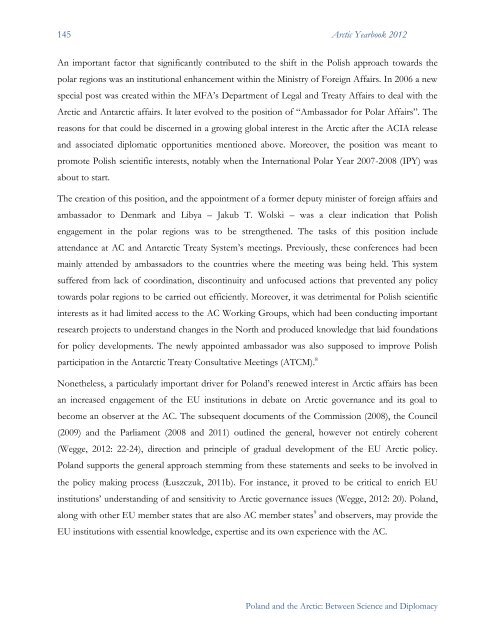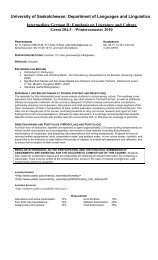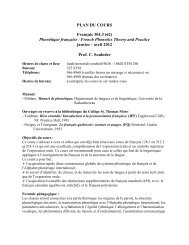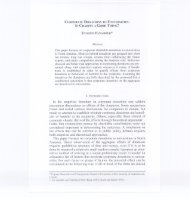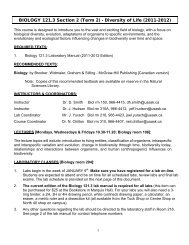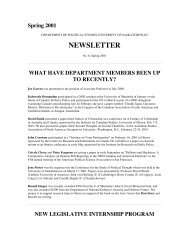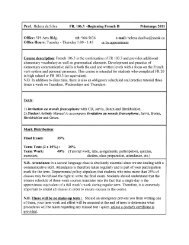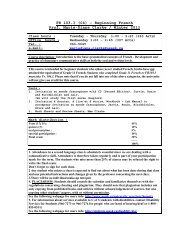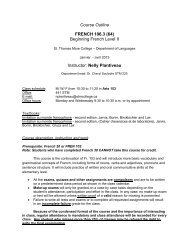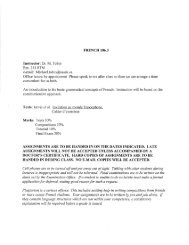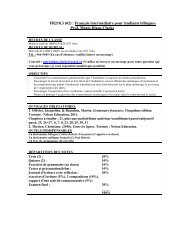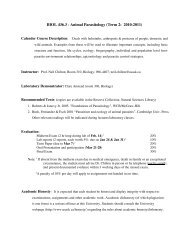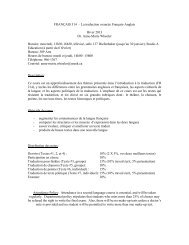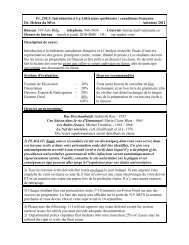- Page 1 and 2:
Lassi Heininen, Editor Heather Exne
- Page 3 and 4:
ii Arctic Yearbook 2012 Heininen, L
- Page 5 and 6:
iv Acronyms A5 Arctic 5 AAC Arctic
- Page 7 and 8:
vi MFA Ministry of Foreign Affairs
- Page 9 and 10:
viii Preface The Arctic serves as a
- Page 11 and 12:
x Mia Bennett's highlights for 2011
- Page 13 and 14:
2 State of the Arctic Strategies an
- Page 15 and 16:
4 Arctic Yearbook 2012 Correspondin
- Page 17 and 18:
6 Arctic Yearbook 2012 historical p
- Page 19 and 20:
8 Arctic Yearbook 2012 The four cha
- Page 21 and 22:
10 Arctic Yearbook 2012 up’ and s
- Page 23 and 24:
12 Iceland’s Report on the High N
- Page 25 and 26:
14 Arctic Yearbook 2012 The emphasi
- Page 27 and 28:
16 Arctic Yearbook 2012 The Norwegi
- Page 29 and 30:
18 Arctic Yearbook 2012 an interest
- Page 31 and 32:
20 Arctic Yearbook 2012 resource ba
- Page 33 and 34:
22 Arctic Yearbook 2012 environment
- Page 35 and 36:
24 Arctic Yearbook 2012 lacking in
- Page 37 and 38:
26 Arctic Yearbook 2012 This is fir
- Page 39 and 40:
28 Arctic Yearbook 2012 maintain it
- Page 41 and 42:
30 Arctic Yearbook 2012 Differences
- Page 43 and 44:
32 Arctic Yearbook 2012 the factors
- Page 45 and 46:
34 Arctic Yearbook 2012 Norwegian s
- Page 47 and 48:
36 Arctic Yearbook 2012 from exploi
- Page 49 and 50:
38 Arctic Yearbook 2012 the post-Co
- Page 51 and 52:
40 Arctic Yearbook 2012 All the str
- Page 53 and 54:
42 Arctic Yearbook 2012 phenomenon,
- Page 55 and 56:
44 Arctic Yearbook 2012 An interest
- Page 57 and 58:
46 Arctic Yearbook 2012 Heininen, L
- Page 59 and 60:
Non-Arctic States: The Observer Que
- Page 61 and 62:
50 Arctic Council States: Canada De
- Page 63 and 64:
Thawing Ice and French Foreign Poli
- Page 65 and 66:
54 Arctic Yearbook 2012 permanent s
- Page 67 and 68:
56 Arctic Yearbook 2012 Christophe
- Page 69 and 70:
58 Arctic Yearbook 2012 Norway’s
- Page 71 and 72:
60 Arctic Yearbook 2012 While liter
- Page 73 and 74:
62 Arctic Yearbook 2012 The Air Fo
- Page 75 and 76:
64 Arctic Yearbook 2012 French Pola
- Page 77 and 78:
66 Arctic Yearbook 2012 Professor a
- Page 79 and 80:
68 Arctic Yearbook 2012 forward thi
- Page 81 and 82:
70 Arctic Yearbook 2012 involvement
- Page 83 and 84:
72 Arctic Yearbook 2012 covered by
- Page 85 and 86:
74 Conclusions Arctic Yearbook 2012
- Page 87 and 88:
76 Arctic Yearbook 2012 Usage to de
- Page 89 and 90:
78 Arctic Yearbook 2012 Boswell, Ra
- Page 91 and 92:
80 Arctic Yearbook 2012 Bl_Plouffe.
- Page 93 and 94:
82 Alexeeva and Lasserre Arctic Yea
- Page 95 and 96:
84 Alexeeva and Lasserre Arctic Yea
- Page 97 and 98:
86 Alexeeva and Lasserre Arctic Yea
- Page 99 and 100:
88 Notes Alexeeva and Lasserre Arct
- Page 101 and 102:
90 Alexeeva and Lasserre Arctic Yea
- Page 103 and 104:
Commentary: China and Arctic Affair
- Page 105 and 106: 94 Japan’s Arctic Policy: The Sum
- Page 107 and 108: 96 Tonami and Watters Arctic Yearbo
- Page 109 and 110: 98 Tonami and Watters Arctic Yearbo
- Page 111 and 112: 100 Tonami and Watters Arctic Yearb
- Page 113 and 114: 102 OPRF/Business INSROP and JANSRO
- Page 115 and 116: 104 Tonami and Watters Arctic Yearb
- Page 117 and 118: 106 An Overview of Singapore’s Ar
- Page 119 and 120: 108 Watters and Tonami Arctic Yearb
- Page 121 and 122: 110 Watters and Tonami Arctic Yearb
- Page 123 and 124: 112 Watters and Tonami Arctic Yearb
- Page 125 and 126: 114 Watters and Tonami Arctic Yearb
- Page 127 and 128: 116 Johnstone Arctic Yearbook 2012
- Page 129 and 130: 118 Johnstone Arctic Yearbook 2012
- Page 131 and 132: 120 Johnstone Arctic Yearbook 2012
- Page 133 and 134: 122 Johnstone Arctic Yearbook 2012
- Page 135 and 136: 124 Johnstone Environmental and Sci
- Page 137 and 138: 126 Johnstone Arctic Yearbook 2012
- Page 139 and 140: 128 Johnstone Arctic Yearbook 2012
- Page 141 and 142: 130 Johnstone Arctic Yearbook 2012
- Page 143 and 144: 132 Depledge Arctic Yearbook 2012 R
- Page 145 and 146: 134 Depledge Arctic Yearbook 2012 T
- Page 147 and 148: 136 Depledge Arctic Yearbook 2012 c
- Page 149 and 150: 138 Acknowledgements Depledge Arcti
- Page 151 and 152: Poland and the Arctic: Between Scie
- Page 153 and 154: 142 Graczyk Arctic Yearbook 2012 It
- Page 155: 144 Graczyk Arctic Yearbook 2012 by
- Page 159 and 160: 148 Graczyk Arctic Yearbook 2012 mi
- Page 161 and 162: 150 A Polish Arctic Policy? Graczyk
- Page 163 and 164: 152 Graczyk Arctic Yearbook 2012 wh
- Page 165 and 166: 154 References Graczyk Arctic Yearb
- Page 167 and 168: 156 Graczyk Arctic Yearbook 2012 We
- Page 169 and 170: 158 Arctic Yearbook 2012 and indige
- Page 171 and 172: 160 Section II: Critical Geopolitic
- Page 173 and 174: 162 Fabbi Arctic Yearbook 2012 the
- Page 175 and 176: 164 Fabbi Arctic Yearbook 2012 (ibi
- Page 177 and 178: 166 Indigenous Diplomacies in Inter
- Page 179 and 180: 168 Fabbi Arctic Yearbook 2012 the
- Page 181 and 182: 170 Fabbi to exercise self-determin
- Page 183 and 184: 172 Fabbi Arctic Yearbook 2012 Inte
- Page 185 and 186: 174 Fabbi Arctic Yearbook 2012 7. A
- Page 187 and 188: 176 Fabbi Arctic Yearbook 2012 Norw
- Page 189 and 190: 178 Commentary: A Voice from the Ar
- Page 191 and 192: 180 The Arctic Environment - From L
- Page 193 and 194: 182 Nilsson Arctic Yearbook 2012 be
- Page 195 and 196: 184 Nilsson Arctic Yearbook 2012 as
- Page 197 and 198: 186 Nilsson Arctic Yearbook 2012 co
- Page 199 and 200: 188 Nilsson Arctic Yearbook 2012 re
- Page 201 and 202: 190 Nilsson Arctic Yearbook 2012 ag
- Page 203 and 204: 192 Nilsson Arctic Yearbook 2012 ex
- Page 205 and 206: 194 Nilsson Arctic Yearbook 2012 Gl
- Page 207 and 208:
196 Finger-Stich and Finger Arctic
- Page 209 and 210:
198 Finger-Stich and Finger Arctic
- Page 211 and 212:
200 Finger-Stich and Finger Arctic
- Page 213 and 214:
202 Finger-Stich and Finger Arctic
- Page 215 and 216:
204 Finger-Stich and Finger Arctic
- Page 217 and 218:
206 Finger-Stich and Finger Arctic
- Page 219 and 220:
208 Finger-Stich and Finger Arctic
- Page 221 and 222:
210 Finger-Stich and Finger Arctic
- Page 223 and 224:
212 Finger-Stich and Finger Arctic
- Page 225 and 226:
214 Finger-Stich and Finger Arctic
- Page 227 and 228:
216 Finger-Stich and Finger Arctic
- Page 229 and 230:
218 Finger-Stich and Finger Arctic
- Page 231 and 232:
220 Finger-Stich and Finger Arctic
- Page 233 and 234:
222 Finger-Stich and Finger Arctic
- Page 235 and 236:
224 Section III: Circumpolar Relati
- Page 237 and 238:
Exner-Pirot Arctic Yearbook 2012 It
- Page 239 and 240:
Figure 1 2007 Sea ice extent in sq
- Page 241 and 242:
Exner-Pirot Arctic Yearbook 2012 Gr
- Page 243 and 244:
Exner-Pirot Arctic Yearbook 2012 NO
- Page 245 and 246:
Exner-Pirot Arctic Yearbook 2012 es
- Page 247 and 248:
Exner-Pirot Arctic Yearbook 2012 de
- Page 249 and 250:
Exner-Pirot Arctic Yearbook 2012 ho
- Page 251 and 252:
CAFF working group, but has not bee
- Page 253 and 254:
Exner-Pirot Arctic Yearbook 2012 en
- Page 255 and 256:
References Exner-Pirot Arctic Yearb
- Page 257 and 258:
Exner-Pirot Arctic Yearbook 2012 ht
- Page 259 and 260:
248 Arctic Yearbook 2012 and eventu
- Page 261 and 262:
250 Arctic Yearbook 2012 sea ice. I
- Page 263 and 264:
252 Unofficial Functional Definitio
- Page 265 and 266:
254 Arctic Yearbook 2012 This means
- Page 267 and 268:
256 Arctic Yearbook 2012 Suez Canal
- Page 269 and 270:
258 Figure 3: The Northwest Passage
- Page 271 and 272:
260 Arctic Yearbook 2012 The discov
- Page 273 and 274:
262 Arctic Yearbook 2012 Canada’s
- Page 275 and 276:
264 Arctic Yearbook 2012 freedoms o
- Page 277 and 278:
266 Arctic Yearbook 2012 sea ice -
- Page 279 and 280:
268 The Northern Maritime Corridor
- Page 281 and 282:
270 Arctic Yearbook 2012 as the “
- Page 283 and 284:
272 Arctic Yearbook 2012 system ass
- Page 285 and 286:
274 Arctic Yearbook 2012 the volume
- Page 287 and 288:
276 Arctic Yearbook 2012 logistical
- Page 289 and 290:
278 Arctic Yearbook 2012 Subterfuge
- Page 291 and 292:
280 Arctic Yearbook 2012 Simonsen,
- Page 293 and 294:
282 Arctic Yearbook 2012 the Northw
- Page 295 and 296:
284 Arctic Yearbook 2012 Trans-Arct
- Page 297 and 298:
286 Arctic Yearbook 2012 observatio
- Page 299 and 300:
288 Arctic Yearbook 2012 Table 1 Ma
- Page 301 and 302:
290 Arctic Yearbook 2012 that a por
- Page 303 and 304:
292 Arctic Yearbook 2012 Instead of
- Page 305 and 306:
294 Arctic Yearbook 2012 to less th
- Page 307 and 308:
296 Arctic Yearbook 2012 Figure 6 D
- Page 309 and 310:
298 Arctic Yearbook 2012 that a mel
- Page 311 and 312:
300 Arctic Yearbook 2012 heavy and
- Page 313 and 314:
302 Arctic Yearbook 2012 11. Intern
- Page 315 and 316:
304 Arctic Yearbook 2012 HSBC (2011
- Page 317 and 318:
306 Arctic Yearbook 2012 for the No
- Page 319 and 320:
308 Commentary: Thinking About the
- Page 321 and 322:
310 Arctic Yearbook 2012 fundamenta
- Page 323 and 324:
312 Stephenson Arcitc Yearbook 2012
- Page 325 and 326:
314 Stephenson Arcitc Yearbook 2012
- Page 327 and 328:
316 Stephenson Arcitc Yearbook 2012
- Page 329 and 330:
318 Stephenson Arcitc Yearbook 2012
- Page 331 and 332:
Road length (1000 km) 320 Stephenso
- Page 333 and 334:
322 Stephenson Arcitc Yearbook 2012
- Page 335 and 336:
324 Stephenson Arcitc Yearbook 2012
- Page 337 and 338:
326 Stephenson Arcitc Yearbook 2012
- Page 339 and 340:
328 Stephenson Arcitc Yearbook 2012
- Page 341 and 342:
330 Stephenson Arcitc Yearbook 2012
- Page 343 and 344:
332 Stephenson Arcitc Yearbook 2012
- Page 345 and 346:
334 Section IV: Update on the UArct
- Page 347 and 348:
336 Arctic Yearbook 2012 Arranged f
- Page 349 and 350:
338 Arctic Yearbook 2012 and non-st


